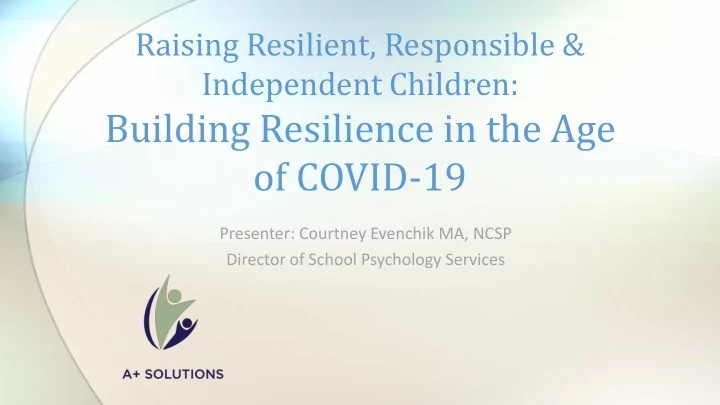

Raising Resilient, Responsible & Independent Children: Building Resilience in the Age of COVID-19 Presenter: Courtney Evenchik MA, NCSP Director of School Psychology Services
What is Resilience? Resilience is having the ability to bounce back from stress, challenges, tragedy, trauma or adversity.
COVID-19 What does resilience look like now?
Good News! • Resiliency can be taught and nurtured in all children.
How Important is Temperament? • Thomas and Chess’s Temperament Types: • 1. The Easy Child • 2. The Slow To Warm Up Child • 3. The Difficult Child
Let’s hear their stories. Josh Sam
Carol Dweck’s Study • Looked at 400 5 th graders from all over the country • Split them into 2 groups and asked them to do puzzles • One group received praise for being smart • One group received praise for their hard work and effort “Smart” group thought effort was a sign of weakness and gave up easily “Effort” group thought intelligence was something they had control over and enjoyed the challenges. Conclusion: Praise in a way that gives children the message that process is as if not more important than the product. This type of praise build’s competence in our children.
Praise Parents Often Give: What Children Hear: • You learned that math so • If I don’t learn something quickly, quickly! You are brilliant! I’m not smart. • Look at this amazing drawing! • I shouldn’t try drawing anything You are the next Monet. hard or they’ll see I’m no Monet. • I’d better quit studying or they • You are so smart you got an ‘A’ won’t think I am smart. without studying.
Descriptive Praise Describe what you see. “You put the blocks back where they belong.” Describe what you feel . “It’s a pleasure to walk into a clean room.” Ask Questions . “What was the hardest part of playing the piano piece.”
More Examples of Descriptive Praise • That homework took a long time. You should be proud of yourself for the way you concentrated and finished it. • You put a lot of thought into that essay. I learned a lot of new information about snow leopards. • This picture has so many colors. Tell me about them?
Descriptive praise when kids try and don’t do well. • I noticed the effort you put in. Let’s figure out what part you didn’t understand and work on that. • People learn in different ways. Let’s keep trying and find the way that works for you. • I know this was your favorite toy and it was hard to share with your friend. Next time I know you will come up with a solution so you can play together without fighting.
Growth vs. Fixed Mindset
Ways to Promote Growth Mindset • 1. Have Daily Learning Discussions • At dinner, in the car, or at bedtime ask questions like “Tell me something you learned today?” or “What was the most challenging part of the day?” • Parents should model and answer these questions too. • 2. Give Feedback On Process Only • Praise for effort, persistence, perseverance, planning, creative strategies, improvement and setting goals. • Avoid evaluative praise like smart, pretty, amazing, and awesome. These types of praise actually lead to loss of confidence.
Ways to Promote Growth Mindset • 3. Do you know brains can grow? • Explain to your children that our brains can grow stronger and our intelligence can improve throughout life.
Ways to Promote Growth Mindset • 4. Encourage risk, failing, and learning from mistakes. • Failure teaches resiliency • Good life lesson. It’s okay to let kids experience sadness and disappointment. • Wendy Mogel says parents should be caring, concerned but not enmeshed in their children’s lives. • Tell children about famous people’s failures. • Walt Disney was fired from a newspaper for lacking imagination and having no original ideas. • Michael Jordon was cut from his high school basketball team.
Ways to Promote Growth Mindset • 5. Encourage and model positive self talk • Self-talk is where the thinking starts to shift. • Teach how to reframe challenges.
Help Your Children Manage Their Emotions. • All feelings are accepted however not all behaviors are accepted. • The key is to learn to feel comfortable with their feelings (positive and negative) but not let them take charge and lead to trouble. • Example- If your child is throwing a tantrum, you can say, “I see you are very angry that we are not getting ice cream today, and throwing things is unacceptable.” • Validation and Rules are not mutually exclusive
Mindfulness Practice What is mindfulness? Square Breathing • Focus on the present moment • Nonjudgmental – no ‘good’ or ‘bad’ thoughts • Creates changes in the brain that supports a healthy response to stress
Practice Problem Solving • Give our children the language to solve their own problems. • What has worked before? • What would (role model, capable person) do? • Say as many ideas as you can even the crazy silly ones. • How can we break this big problem into smaller ones?
Build Trusting Supportive Relationships • A reliable supportive person has a huge impact on bouncing back from adversity • Social support is linked to higher positive emotions, self- esteem, motivations and optimism • Unconditional love builds a solid foundation to come back to when the world feels a little crazy.
Who’s the smart one?
Contact Me Courtney Evenchik, MA NCSP Director of School Psychology Services A+ Solutions 3659 Green Rd, Suite 112 Beachwood, OH 44122 216-896-0111 courtney.evenchik@thinkaplus.com
Recommend
More recommend